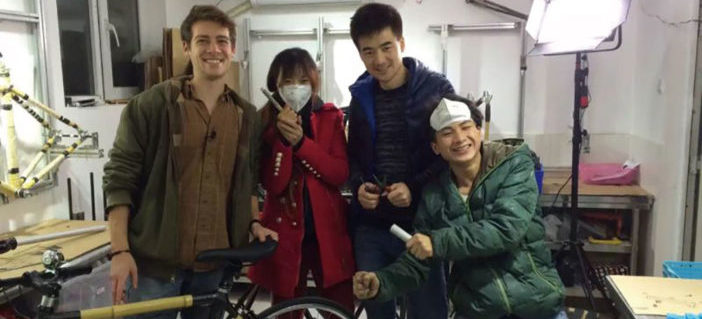According to Luo, volunteers are welcome to do more of “what makes them forget about time.”
Pandas and bikes have something in common these days – bamboo. However, while you won’t find a panda riding a bicycle, you may just find bamboo on your next ride. Bamboo Bikes Beijing (BBB) is a community-driven social enterprise that “strives to empower [the]local community to take ownership over their mobility and environment.” They seek to do this, “through shared tangible action and creation in [their]workshop spaces.” Currently, the team works out of what used to be a former mah-jong workshop in a hutong near Beijing’s Drum Tower.
Biking with Purpose
In the 1990’s one couldn’t encounter a Beijing street without finding a sea of commuters on their bicycles. As China has developed economically, car ownership has boomed, becoming a symbol of high social status and wealth. By 2015, there were over five million cars in Beijing, an increase which also meant heavy burdens on the city’s air quality and traffic infrastructure. Through the cloud of car exhaust, David Wang, founder of BBB, saw a need for cycling. Wherever he went in Beijing, there were abandoned bicycles lying in piles and, over time, Wang began to rebuild them.
Part of BBB’s purpose is to help people become more passionate about cycling and bicycles. Wang started BBB in 2013 after a stint of fixing the old, rusted bikes that littered Beijing, and in 2014 raised money through a Kickstarter campaign. After realizing that the frames of found bikes were unsalvageable due to rust or other wear and tear, Wang started using bamboo to replace degraded parts. One bicycle that he found was particularly corroded and so in order to save it, Wang created a new frame out of bamboo and rebuilt the bike. After months of research, contacting factories and experts, and experimenting with different techniques, he found a way to build a working, bamboo-framed bicycle.
Later in 2013, Wang applied for a grant in Taiwan, one of the largest producers of bamboo, and visited in order to find out more about the properties and uses of bamboo. He learned about the different techniques for shaping bamboo, how to use it in building, the types of bamboo he should be building with, and the material’s varying properties. Since its founding, Bamboo Bicycles has grown and spread around the globe with locations in Beijing, Shanghai, and Boston. The organization has also run bike-building workshops in various places in China as well as in Laos, Ethiopia, Denver, and Boston. So far, BBB has helped customers and volunteers build over 200 bamboo bikes.
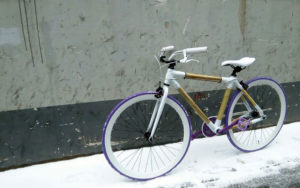
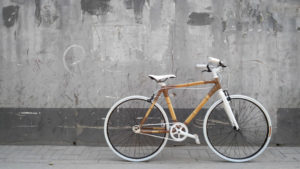
Volunteering in Beijing
BBB is open to volunteers every weekend but also throughout the week as long as they tell BBB ahead of time. Mowgli Luo, BBB’s Workshop Manager and Lead Mechanic, says that volunteers can stay as long or little as they please during their shifts but that builders should arrive by 9am on start day. During the weekends, volunteers can help customers and other participants build bamboo bikes or work on their own projects. Attending bike workshops does not require much preparation and all Luo recommends is that volunteers wear clothes that they don’t mind getting dirty and maybe bring some music to share with the group. BBB welcomes people of all ages with the only constraints being that they must be “old enough to handle themselves, but young enough to have fun [with the crew and participants].”
Volunteers can help build bamboo bicycles during the weekends and all bikes can be built over the course of two days. For individuals that would like to build their bamboo bikes in one weekend without volunteering, the cost is RMB 2,000 total. The team and volunteers will help teach the bike builder how to complete their masterpiece over the course of two days. On the other hand, individuals interested in subsidizing the cost of a bamboo bike have the option of volunteering for eight days and only paying for the cost of bike parts. For volunteers who take this opportunity, the lowest price for building a bike stands at roughly RMB 700. After building their bikes, or even without building their own, some volunteers choose to stay on long-term.
The weekend bike-construction project is broken down into two parts: (1) shaping your bamboo frame, and (2) making the frame strong. The first day includes builders picking out the pieces for their frame and lightly tacking the pieces together. On day two, customers and volunteers work together to wrap the joints of the bamboo frame in carbon fiber and fiberglass to ensure that the bike holds together. The project is finished off by adjoining the brace, bridge, and other bike pieces to the bamboo frame.
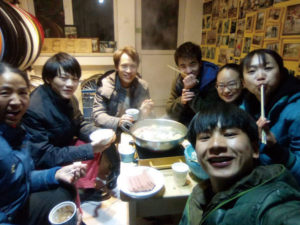
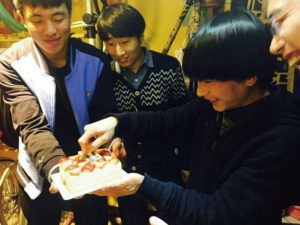
BBB as an organization operates in a casual manner. According to Luo, volunteers are welcome to do more of “what makes them forget about time.” Luo says that longer-term volunteers have also been involved in organizing events such as bike rides, or traveling with BBB to staff exhibition booths in Beijing and in other places in China to educate the public about BBB. Mowgli himself used a bamboo bike to complete a week-long bike race in Yunnan. Noah Lerner, a volunteer for BBB since the fall of 2016, describes BBB as a type of family and that once part of the group, it’s not uncommon to go out for dinners or attend events with other members.
Some volunteers have also helped to teach bike building tutorials at schools in Beijing. Lerner has also been a regular volunteer workshop instructor at a local Beijing middle school. Lerner has guided students at Chinese public schools and helped them earn credit for their experiential learning courses. On the weekends that he teaches, Lerner shows students how to assemble bamboo bikes, spreading the love of cycling and handiwork for which BBB is known. Lerner also mentioned families with kids have visited BBB and built bikes together. One child didn’t even know how to ride a bike, yet diligently spent the day learning to build a bike alongside his father.
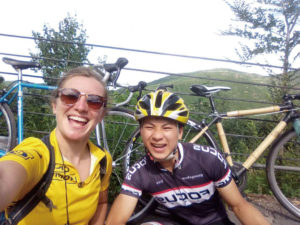
As China continues to grow and cars pile onto the streets, BBB hopes to increase awareness of sustainable biking options. Maybe one day rather than a sea of cars, Beijing roads may be packed with bamboo bikes and their riders.
Bamboo Bikes Beijing
26 Langjia Hutong, Dongcheng District, Beijing
Monday-Friday 10am-6pm, Weekend Workshops 9am-7pm
(info@bmaboobicyclesbj.com, Mowgli’s WeChat: himowgli)
北京市东城区良家胡同26号
Photos courtesy of Mowgli Luo

This is an updated version of the article that originally appeared on p. 24-25 of beijingkids March Issue. Download the digital copy here.

